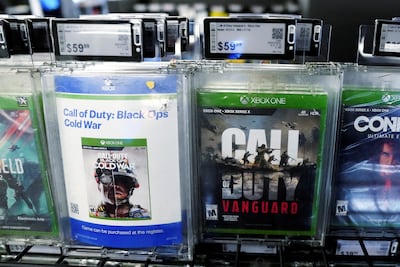The UK's antitrust watchdog has blocked Microsoft's $69 billion takeover of games company Activision Blizzard.
The Competition and Markets Authority vetoed what would have been the gaming industry’s biggest deal, saying it would harm competition on the cloud.
It added that Microsoft's commitment to offer access to Activision's multibillion-dollar Call of Duty games to leading cloud-gaming platforms would not remedy its concerns.
In cloud gaming, players stream games on mobile phones and hand-held devices they already own.
The CMA has “prevented Microsoft's proposed purchase of Activision over concerns the deal would alter the future of the fast-growing cloud-gaming market, leading to reduced innovation and less choice for UK gamers over the years to come”, it said in a statement.
Microsoft and Activision say they will appeal the decision.
Martin Coleman, chairman of the independent panel of experts brought in by the CMA to examine the deal, explained why it had been rejected.
“Microsoft already enjoys a powerful position and head start over other competitors in cloud gaming and this deal would strengthen that advantage, giving it the ability to undermine new and innovative competitors,” he said.
“Microsoft engaged constructively with us to try to address these issues and we are grateful for that, but their proposals were not effective to remedy our concerns and would have replaced competition with ineffective regulation in a new and dynamic market.
“Cloud gaming needs a free, competitive market to drive innovation and choice. That is best achieved by allowing the current competitive dynamics in cloud gaming to continue to do their job.”

Sophie Lund-Yates, lead equity analyst at Hargreaves Lansdown, explained why the acquisition is important for Microsoft.
“Microsoft needs this deal to help stoke growth in the wake of disappointing personal computer sales, with the gaming market a far more high-growth area, which would supplement the group’s leading AI position,” she said.
“Activision’s incredible haul of intellectual property is a big factor in this situation, but more broadly, as cloud gaming continues to grow and regulators learn as they go, tougher regulations and frustrating corporate outcomes are likely.”
The US and EU have also voiced concerns over the deal.
The CMA feared that the deal could undermine fair competition in cloud gaming if the Xbox maker decides to make Activision’s games exclusive to its cloud-gaming platform.
Microsoft president Brad Smith said: “We’re especially disappointed that after lengthy deliberations, this decision appears to reflect a flawed understanding of this market and the way the relevant cloud technology actually works.”
He said the decision “rejects a pragmatic path to address competition concerns” and discourages tech innovation and investment in the UK.
Activision said it would “work aggressively with Microsoft to reverse this on appeal”.
A spokeswoman for Activision Blizzard said: “The CMA's report contradicts the ambitions of the UK to become an attractive country to build technology businesses.
“We will work aggressively with Microsoft to reverse this on appeal. The report's conclusions are a disservice to UK citizens, who face increasingly dire economic prospects.
“We will reassess our growth plans for the UK. Global innovators large and small will take note that — despite all its rhetoric — the UK is clearly closed for business.”
If approved, it would also have given Microsoft control of other hugely popular titles including World of Warcraft and Candy Crush. Activision's flagship Call of Duty franchise was important in driving up competition between consoles.
The all-cash deal was set to be the largest in tech industry.


